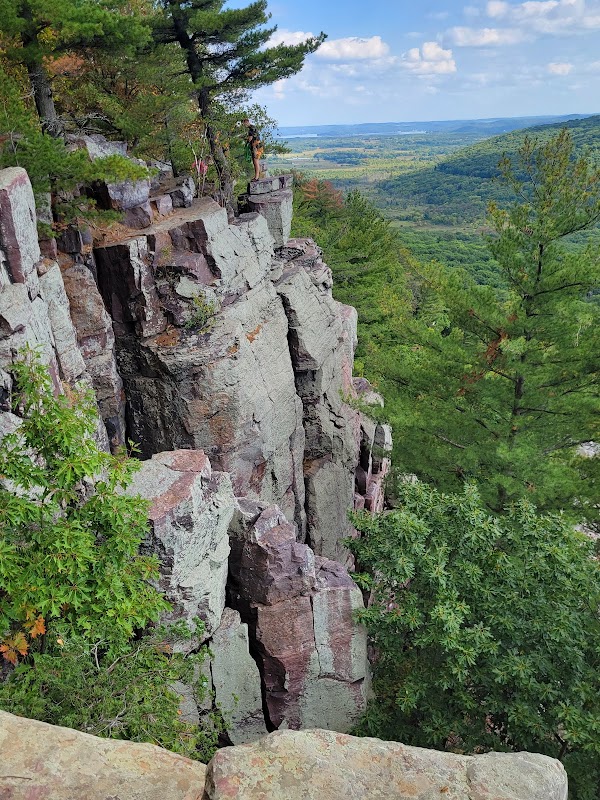
Eagle River Festival: Adventure and Culture Unfold in Eagle, Wisconsin
The Eagle River Festival in Eagle, Wisconsin, combines invigorating outdoor trails with rich local culture, offering an accessible adventure for all levels. Join guided hikes, artisan markets, and riverside concerts that bring this vibrant community to life every summer.
Wear Sturdy Footwear
Trails mix rocky patches with roots and occasional slippery soil near the river; hiking boots or trail shoes with good grip are needed to stay safe and comfortable.
Hydrate Throughout the Day
Water stations exist but are spaced out; bring at least one liter of water and refill when possible to maintain energy and alertness.
Start Your Hike Early
Morning temperatures are cooler and the light ideal for photography and wildlife spotting; afternoons tend to warm quickly, especially in summer months.
Respect the River and Trails
Stay on marked paths to protect the ecosystem; the Eagle River’s currents push steadily—avoid swimming or crossing in unsafe areas during the festival.
Eagle River Festival: Adventure and Culture Unfold in Eagle, Wisconsin
Every summer, Eagle, Wisconsin transforms into a hub of vibrant energy with the Eagle River Festival—a celebration that strikes a balance between outdoor adventure and authentic local culture. Set alongside the shimmering waters of the Eagle River, the festival invites everyone from families to seasoned adventurers to experience curated events that pulse with regional flavor and natural choreography.
The heart of the festival beats along rugged trails tracing the river’s path, where hikers can engage with terrain that tests endurance without overwhelming. Trails range from gentle 2-mile loops to more demanding 5-mile stretches with elevation gains up to 500 feet. Pine and hardwoods lean toward the sunlit clearings, their branches seeming to beckon visitors deeper into the woods. Along the way, the river dares you to pause—its current pushing forward, refusing to be tamed.
Festival activities blend outdoor challenges with cultural encounters: guided hikes introduce local flora and fauna with insights from expert naturalists, while artisan booths offer handcrafted goods that reflect the region’s history and spirit. Evening concerts echo across the water, inviting visitors to unwind under starry skies where the cool night air carries the scent of pine and campfire.
Practical planning makes this adventure accessible. Trails are well-marked, but sturdy footwear is crucial—roots and rocky patches keep your steps lively and alert. Hydration is non-negotiable; water stations are available but carrying a personal bottle ensures rhythm uninterrupted. For timing, mornings offer the best light and cooler temps, while afternoons bring a gentle warmth that adds to the festival’s vibrant pulse.
Respect for the environment is key. The forest and river are vigorously themselves, responding to your presence with rustling leaves and shifting currents. Stay on paths to protect delicate groundcover, and carry out all waste. This is an engagement with nature that requires attentiveness and care.
Whether you’re chasing the thrill of trails or curious about the cultural stories infused in every breath of Eagle’s summer air, the Eagle River Festival delivers an experience grounded in discovery and connection. It’s adventure with a practical edge—exciting without excess, invigorating without overreach. Get ready to hike, learn, and celebrate where Wisconsin’s wild side is at once inviting and demanding equal respect.
Nearby Trips
All Adventures
Boat Charters
Water Activities
Adventures near Eagle, Wisconsin
Discover the unique and memorable adventures that make Eagle, Wisconsin special.
Frequently Asked Questions
What is the best way to get around during the Eagle River Festival?
The festival area is compact and walkable, but renting a bike or using available shuttle services can save time, especially if planning to explore both trails and cultural venues.
Are there guided hikes available during the festival?
Yes, expert-led hikes run most festival days, offering insights into local wildlife, plant identification, and safety tips for navigating the terrain.
Can the Eagle River be used for recreational activities during the festival?
Boating and fishing are common, but swimming is discouraged due to strong and unpredictable currents, especially near festival sites.
Is the festival family-friendly?
Absolutely. The event includes kid-friendly hikes, craft workshops, and open spaces designed for families to enjoy nature safely.
Are there any ticket requirements or fees for the festival and trails?
The festival itself has free access, though some workshops or guided hikes may have nominal fees. Most trail access is open and free to festival visitors.
What local foods can visitors expect during the festival?
You’ll find regional staples like fresh lake fish, artisanal cheeses, and berry-based treats, reflecting Wisconsin’s farming and fishing heritage.
Recommended Gear
Hiking Boots
Provides ankle support and good traction over rocky and root-covered trails, indispensable year-round.
Reusable Water Bottle
Staying hydrated is essential, especially during summer festival days when heat and activity levels rise.
Insect Repellent
Keeps mosquitoes and ticks in check during warm months when insect activity peaks.
Layered Clothing
Allows quick adaptation to variable temperatures, particularly in crisp fall mornings and chilly evenings.
Local Insights
Hidden Gems
- "Eagle River’s Old Iron Bridge viewpoint offers quieter river perspectives away from the crowd."
- "A small waterfall on the northern trail provides a refreshing stop and photographic opportunity."
Wildlife
- "White-tailed deer often graze near trail edges in early morning."
- "Look for red fox tracks and the occasional bald eagle soaring above the river."
History
"Eagle River’s roots lie in logging and river trade, with the festival paying homage to the native Ojibwe communities and early settlers through workshops and storytelling."
